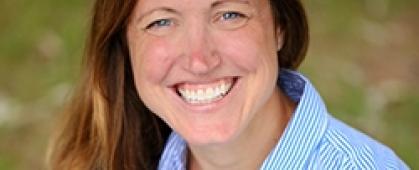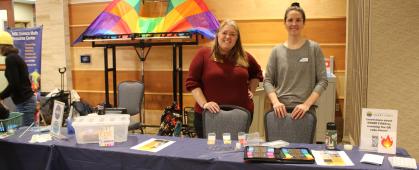Meet Dr. Elizabeth (Liddi) Brinck Meredith, Hydrogeologist and Research Professor, Montana Bureau of Mines and Geology at Montana Technological University, Butte. Dr. Meredith is a member of the EPSCoR Track 1 research team studying how energy development affects water quality in the Powder River Basin. In this interview, Liddi shared information about her career with the Montana Girls STEM Collaborative, an outreach program of Montana NSF EPSCoR. Her interview is reprinted here in its entirety in order to share career pathways with young people in Montana.
What do you do for your job?
I identify water-quality and -quantity information needs of the water users in the state. Montana water users can be irrigators, homeowners who use a domestic well, and ranchers who need water for their stock. Once a need is identified, I design a study to address their questions and usually write a grant to fund the study. After I’ve gathered the groundwater and surface-water data I need to address the water-users’ questions, I present the information in a variety of formats including presentations, pamphlets, and scientific reports.
What did you like to do as a young person? At what age and how did you know you wanted to be a scientist?
I grew up next to a forested creek valley. I spent a lot of time there exploring with my sister and dogs. In high school I really liked math and physics, so I decided to major in physics in college and minored in math and geology. After college, I joined the Peace Corps and lived in Ghana, West Africa where I learned the true value of water (and many other things). Upon returning to the US, I decided to pursue a graduate degree that would lead to a career in applied research in support of protecting groundwater – low-temperature aqueous geochemistry. That mouthful really just means “groundwater quality”.
Who were some of the role models, mentors or other adults who influenced you as a young person?
My graduate advisor, Dr. Carol Frost, is the woman who first showed me a path forward for balancing a satisfying research career while also raising a family. I still look to the example she set for not compromising her high quality research while still prioritizing time spent with family. Which is not to say that balance is easily achieved, but a woman does not have to be apologetic for striving to create that balance.
What advice would you give to a Montana girl who is interested in a career like yours?
Take a wide variety of classes in addition to your favorite science and math classes. Understanding the science is just the beginning. So much of my work depends upon being able to communicate effectively – starting with writing the proposal and ending with presenting the results to a wide variety of audiences. Public speaking and writing courses are, maybe surprisingly, extremely valuable to a career in the sciences.
I’ll also add a career in the sciences does not have to take you far from rural Montana – I work all over eastern Montana, including Alzada, Birney, Broadus, Culbertson, Mosby, Sidney, and Winnett. A background in farming and ranching can help you, as a scientist, accurately identify the research needs of rural Montanans.

